

Blockchain for Document/Records Management across Industries. According to Gartner, records management is ripe for blockchain app development for creating cost-efficiency and revenue acceleration capabilities.
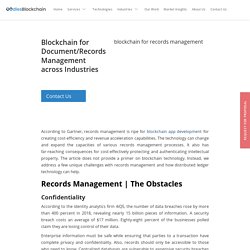
The technology can change and expand the capacities of various records management processes. It also has far-reaching consequences for cost-effectively protecting and authenticating intellectual property. The article does not provide a primer on blockchain technology. Instead, we address a few unique challenges with records management and how distributed ledger technology can help.Records Management | The ObstaclesConfidentialityAccording to the identity analytics firm 4iQ5, the number of data breaches rose by more than 400 percent in 2018, revealing nearly 15 billion pieces of information. Why Choose Hyperledger for Your Business. The Linux Foundation hosts Hyperledger as an umbrella project.
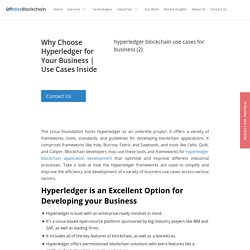
It offers a variety of frameworks, tools, standards, and guidelines for developing blockchain applications. It comprises frameworks like Indy, Burrow, Fabric and Sawtooth, and tools like Cello, Quilt, and Caliper. Blockchain developers may use these tools and frameworks for hyperledger blockchain application development that optimize and improve different industrial processes.
Take a look at how the Hyperledger frameworks are used to simplify and improve the efficiency and development of a variety of business use cases across various sectors.Hyperledger is an Excellent Option for Developing your BusinessHyperledger is built with an enterprise-ready mindset in mind. Blockchain a Must for Supply Chain Development Post COVID-19. Globally, governments have failed to prevent the spread of COVID-19 while companies struggle to minimize the impact on their supply chains.
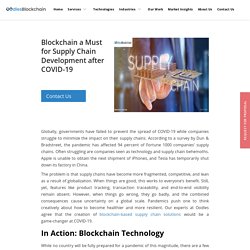
According to a survey by Dun & Bradstreet, the pandemic has affected 94 percent of Fortune 1000 companies’ supply chains. Often struggling are companies seen as technology and supply chain behemoths. Apple is unable to obtain the next shipment of iPhones, and Tesla has temporarily shut down its factory in China.The problem is that supply chains have become more fragmented, competitive, and lean as a result of globalization. Emerging Finance Alternative. Decentralized finance, which we also refer to as DeFi, associates with the transition of financial frameworks from centralized to decentralized.
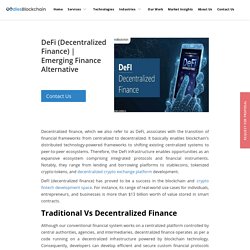
It basically enables blockchain’s distributed technology-powered frameworks to shifting existing centralized systems to peer-to-peer ecosystems. Therefore, the DeFi infrastructure enables opportunities as an expansive ecosystem comprising integrated protocols and financial instruments. Notably, they range from lending and borrowing platforms to stablecoins, tokenized crypto-tokens, and decentralized crypto exchange platform development.DeFI (decentralized finance) has proved to be a success in the blockchain and crypto fintech development space. Markedly, one of the significant DeFi developments is that it has emerged as a replacement of fiat or real-world assets. Now, it enables crypto-assets to come into use in ways not imaginable. Developing an Advanced Crowdfunding Platform with Blockchain. Experts claim that crowdfunding platforms have five major advantages: performance, scope, simpler presentation, built-in PR and marketing, and near-immediate idea validation.
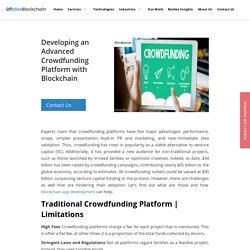
Thus, crowdfunding has risen in popularity as a viable alternative to venture capital (VC). Additionally, it has provided a new audience for non-traditional projects, such as those launched by in-need families or optimistic creatives. Indeed, to date, $34 billion has been raised by crowdfunding campaigns, contributing nearly $65 billion to the global economy, according to estimates. All crowdfunding outlets could be valued at $90 billion, surpassing venture capital funding in the process.
A Compact Guide to Development. The ERC-20 standard specifies the requirements that crypto tokens must meet to run properly on the Ethereum blockchain.
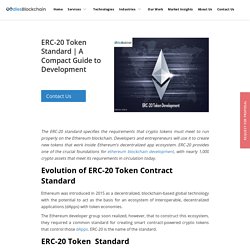
Developers and entrepreneurs will use it to create new tokens that work inside Ethereum’s decentralized app ecosystem. ERC-20 provides one of the crucial foundations for ethereum blockchain development, with nearly 1,000 crypto assets that meet its requirements in circulation today.Evolution of ERC-20 Token Contract StandardEthereum was introduced in 2015 as a decentralized, blockchain-based global technology with the potential to act as the basis for an ecosystem of interoperable, decentralized applications (dApps) with token economies.The Ethereum developer group soon realized, however, that to construct this ecosystem, they required a common standard for creating smart contract-powered crypto tokens that control those dApps.
A Compact Guide for Non-Experts. For your blockchain business app development, are you looking to recruit smart contracts developers or outsource development for smart contracts solutions?
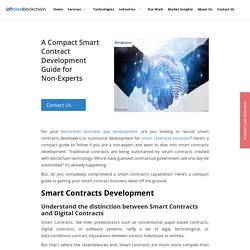
Here’s a compact guide to follow if you are a non-expert and want to dive into smart contracts development. Traditional contracts are being outsmarted by smart contracts created with blockchain technology. Who’d have guessed contractual government will one day be automated? It’s already happening.But, do you completely comprehend a smart contract’s capabilities? Assuring Effective Implementation. What’s great about the decentralized ledger when exploited with blockchain app development services is that it allows companies to take control of their destiny.
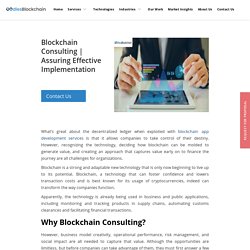
Taking the Crypto Space by Storm. What are NFTs (Non-Fungible Tokens)Non-fungible tokens (NFTs) are indivisible and one-of-a-kind cryptocurrency tokens.
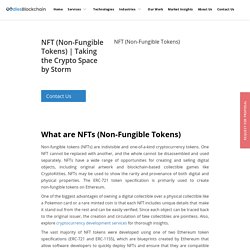
One NFT cannot be replaced with another, and the whole cannot be disassembled and used separately. NFTs have a wide range of opportunities for creating and selling digital objects, including original artwork and blockchain-based collectible games like CryptoKitties. NFTs may be used to show the rarity and provenance of both digital and physical properties. The ERC-721 token specification is primarily used to create non-fungible tokens on Ethereum.One of the biggest advantages of owning a digital collectible over a physical collectible like a Pokemon card or a rare minted coin is that each NFT includes unique details that make it stand out from the rest and can be easily verified.
Since each object can be traced back to the original issuer, the creation and circulation of fake collectibles are pointless. Fuelling the Decentralized Finance Space. What is Yield Farming?
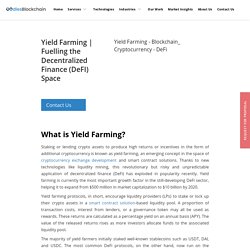
Staking or lending crypto assets to produce high returns or incentives in the form of additional cryptocurrency is known as yield farming, an emerging concept in the space of cryptocurrency exchange development and smart contract solutions. Thanks to new technologies like liquidity mining, this revolutionary but risky and unpredictable application of decentralized finance (DeFi) has exploded in popularity recently. Yield farming is currently the most important growth factor in the still-developing DeFi sector, helping it to expand from $500 million in market capitalization to $10 billion by 2020.Yield farming protocols, in short, encourage liquidity providers (LPs) to stake or lock up their crypto assets in a smart contract solution-based liquidity pool. A proportion of transaction costs, interest from lenders, or a governance token may all be used as rewards. These returns are calculated as a percentage yield on an annual basis (APY).
How Blockchain is Transforming in Media and Entertainment. Blockchain technology has caught the attention of companies across a wide range of sectors, from finance and healthcare to automotive and retail. But what do blockchain solutions mean for the media and entertainment industries? What benefits would blockchain bring to current media value chains, systems, and costs? Can it aid in the development of new services and ways to raise more revenue.Blockchain technology has the potential to help the media and entertainment (M&E) industry significantly. Increasing Significance of Blockchain in Strengthening Automotive.
Whether it’s in ride-sharing, manufacturing, vehicle tracking, or the emerging electric car industry, blockchain automotive solutions are gaining significant traction. The automotive industry is grappling with a rapidly evolving market environment, which involves a rapid and profound change fuelled by changing consumer technology. Oodles’ seasoned team is familiar with the automotive industry’s most pressing problems and how to solve them with blockchain.Buzz around BlockchainBlockchain is a distributed ledger technology that allows multiple participants in a business network to share an immutable record of transactions. In this sense, the word “immutable” means that nobody can edit or delete a transaction record. Indeed, they can only append it. It may be a physical asset, such as a car, a financial asset, such as a loan, or a digital asset, such as a software package.
How Blockchain can Pragmatically Revamp the Mortgage Industry. When we hear the words blockchain and mortgage, we generally think of buying a house or a piece of property with cryptocurrencies. However, beyond that, blockchain technology solutions can be beneficial for the real estate industry, especially across mortgage processes. Maybe not in the ways you would expect. Attorneys draft legal papers, title firms perform title searches, and underwriters determine the loan’s risks. Tracing From Food to Healthcare. The buzz of blockchain technology in the news these days makes it sound like an efficient alternative to address business problems. In this blog, we assess blockchain supply chain development, including benefits, crucial aspects, use case, and network types.Initially, blockchain provided frameworks to facilitate transactions with bitcoin without any intermediary involvement.
This characteristic of blockchain technology remodels transaction mechanisms of not only digital currencies but also a variety of information storage and sharing. Essentially, it highlights the potential to boost the productivity and profitability of most businesses, if not all.We aim to provide you with a better understanding of what blockchain technology is all about. How Blockchain Digitally Transforms Insurance Processes. It appears that there is an increased FOMO among people and they want to learn about Blockchain. Established insurance companies are investing in blockchain app development to transform insurance processes. Businesses are creating consortia around it. Developing Advanced Payment Processing Systems with Blockchain. Developing a Ride-Sharing App like Uber with Blockchain. Accelerating Business Efficiency with Hyperledger Development.
Blockchain Development for Advanced Logistics Solutions. Peer-to-Peer Mobile Payment System Development with Blockchain. Decentralizing Live Streaming Solutions with Blockchain. Why Implement Blockchain for Ecommerce Platform Development. Ethereum Smart Contract Development. Tracing From Food to Healthcare. mHealth Application Development with Blockchain Technology. The healthcare community has recently seen many advancements in healthcare delivery approaches and technology, including mHealth as an evolving field of healthcare apps to increase access to health services. Nevertheless, there are problems involved in the optimal value of mHealth implementation.
Decentralized P2P Exchange Development. Platforms like Bitstamp, Kraken, and others have successfully fulfilled user needs for trading cryptocurrencies for fiat money and vice versa. However, one downside is that centralized corporations govern these exchanges, unlike Bitcoin. It results in requiring the set up of support staff to handle all interactions of users. They also serve as arbitrators in case of conflict resolution. For that, they collect some fees.
Thus, members of the Bitcoin community have decided to streamline the market by creating a new alternative. Strengthening Protection with Robust Security Mechanisms One of the significant attributes of a crypto exchange is security. Advancing Identity Management with Blockchain Technology. Blockchain for Faster And Secure Payment Processing Solutions. A Compact Guide to Permissioned Blockchain App Development. Developing an Online Food Delivery App with Blockchain. Blockchain for Reconciliation and Dispute Resolution Solutions. Accelerate Business Performance. Supply Chain Traceability and Sustainability with Blockchain. P2P Crypto Exchange Development. Why You Must Be Interested in Stablecoin Applications Development. Smart Contracts on Blockchain. Developing a Decentralized E-Voting System with Blockchain.